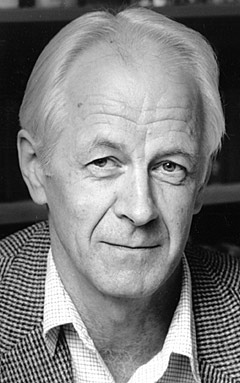KQED-TV to air doc on late revolutionary biologist Allan Wilson
| 04 February 2009
BERKELEY — When University of California, Berkeley, biochemist Allan Wilson died from leukemia at the age of 56 in 1991, he had already revolutionized the study of evolution.
Allan Wilson : Evolutionary documentary trailer.
The New Zealander's life and legacy were profiled in a 2008 documentary, "Allan Wilson: Evolutionary," that will receive its broadcast premiere on KQED-TV at noon on Sunday, Feb. 8, and be rebroadcast on KQED World (Digital Channel 9.3; Comcast Cable Channel 190) the following Saturday, Feb. 14, at 10 p.m.
The 41-minute documentary, written and directed by New Zealander George Andrews and narrated by UC Berkeley's Tim White, professor of integrative biology, includes interviews with many current and former UC Berkeley scientists and many of Wilson's students, who have pushed Wilson's bold ideas into every realm of biology.
"He (Wilson), with his students, essentially invented the field of molecular phylogenetics, the modern application of genomics to the study of evolution," said Geoffrey Owen, UC Berkeley professor emeritus of molecular and cell biology and former dean of the biological sciences who assisted Andrews with the documentary.
Although Wilson's ideas are well accepted today, Owen said, they generated much controversy in 1967 when he and postdoctoral fellow Vincent Sarich, now a UC Berkeley professor emeritus of anthropology, argued that, if genetic mutations occur at the same rate over millions of years, then the sequence differences between proteins or genes from different species could serve as a molecular clock telling scientists how long species had been separated.
 Allan Wilson (Jane Scherr photo, 1990)
Allan Wilson (Jane Scherr photo, 1990)
Obituary (1991): Berkeley's Allan C. Wilson, the world authority on 'molecular evolution,' is dead at 56
Then, in the 1980s, Wilson and his students compared mitochondrial DNA from humans around the globe and determined that all humans descended from a woman who lived 150,000 years ago in Africa.
"That work still excites controversy, though it has largely been accepted by the scientific community," Owen said, noting that "Wilson's students, most notably Svante Paabo (now director of genetics at the Max Planck Institute for Evolutionary Anthropology in Leipzig, Germany), have gone on to lead the field of molecular evolution, studying ancient DNA from mammoths, the giant sloth and, perhaps most importantly from our perspective, Neanderthals."
Sarich, King, Paabo and others, including UC Berkeley biologists David Wake, James Patton and Tim White, were interviewed for the documentary. The piece chronicles Wilson's emergence from a farm in Helvetia, Pukekohe, New Zealand, to the country's University of Otago and then to UC Berkeley, where he obtained his Ph.D. in 1961 and went on to join the faculty as a professor of biochemistry in 1964.
"The documentary presents UC Berkeley as a place where original ideas are nurtured and controversy is not something to be shied away from," Owen said. "Moreover, even in the '70s and '80s, the environment for graduate students and post-docs at Berkeley was highly diverse, not only in terms of ideas but in terms of ethnicity and gender."

